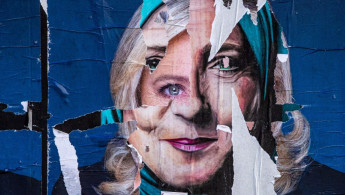French Muslims, minorities brace for presidential election duel between far-right Le Pen and Macron
The second round of the French presidential election on April 24 will be a duel between incumbent president Emmanuel Macron and far-right leader Marine Le Pen, polls revealed late on Sunday after a tense first round.
Stakes are particularly high for French Muslims, many of whom worry about seeing their rights rolled back if Le Pen wins.
Le Pen is the historic leader of the National Rally, formally known as the National Front, which has campaigned on anti-immigration rhetoric for years.
Days before the election, Le Pen said she would ban the wearing of the hijab in public if elected, and that fines would be imposed on women wearing the Islamic headscarf.
But Le Pen's rival, incumbent president Emmanuel Macron, has struggled to convince French minorities about his willingness to defend their rights.
Throughout his five-year mandate, Macron's party has passed a controversial law against "separatism" that is widely seen as discriminatory to Muslims, dissolved a major anti-racist organisation monitoring Islamophobia, and generally stigmatised practising Muslims for their appearance and lifestyle choices.
French Muslims have been leaving their country in ever-greater numbers over the past years, the New York Times reported in February, fleeing a political climate of distrust and scapegoating against their community.
In a speech late on Sunday, Macron positioned himself as a rampart to xenophobia and attempted to reassure France's religious minorities.
"I want a France that fights resolutely against Islamic separatism but that, through secularism, allows everyone to believe or not to believe, to practice their religion. And not a France that prevents Muslims or Jews from eating what their religion prescribes," Macron stated.
Overall, the presidential campaign this year has been marked by the sharp rise of Islamophobic and xenophobic rhetoric among several presidential candidates, notably the TV pundit Eric Zemmour. Zemmour only earned seven percent of the votes on Sunday, most of which are expected to go towards Le Pen in the second round.
Throughout the campaign, several Muslim leaders in France called on their followers to take part in the ongoing presidential elections to check the rise of the far-right. In an op-ed published on February 14 in French daily Le Monde, Chems-Eddine Hafiz, the leader of the Great Mosque in Paris, called on French Muslims to cast their vote in order to "stop the machinery of hatred against Muslims."
Kamel Kabtane, the supervisor of the main mosque in Lyon - a major city in the south of France - and an elected regional leader among French Muslims, also called on followers on Wednesday to "block those [...] who want to kick out of France French citizens simply because they are Muslims." "French Muslims are not second-class citizens," Kabtane recalled in a statement.
The upcoming duel mirrors the last presidential elections five years ago, in which Macron smashed Le Pen with two thirds of votes. But this time, analysts warn the race will be much tighter, with Macron projected to win with only 51 to 54% of vote - if high abstention rates don't flaunt his dream of re-election.





 Follow the Middle East's top stories in English at The New Arab on Google News
Follow the Middle East's top stories in English at The New Arab on Google News
![The UAE is widely suspected of arming the RSF militia [Getty]](/sites/default/files/styles/image_330x185/public/2024-11/GettyImages-472529908.jpg?h=69f2b9d0&itok=Yauw3YTG)
![Netanyahu furiously denounced the ICC [Getty]](/sites/default/files/styles/image_330x185/public/2024-11/GettyImages-2169352575.jpg?h=199d8c1f&itok=-vRiruf5)
![Both Hamas and the Palestinian Authority welcomed the ICC arrest warrants [Getty]](/sites/default/files/styles/image_330x185/public/2024-11/GettyImages-2178351173.jpg?h=199d8c1f&itok=TV858iVg)